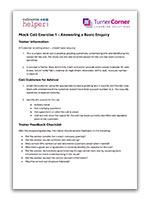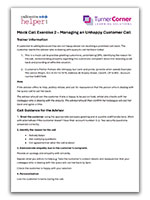Keen to introduce mock calls into your agent training? Mock calls are a great way to build confidence, develop key skills, and prepare new starters for real calls.
In this article, Jacqui Turner of Turner Corner Learning Solutions shares the do’s and don’ts of using mock calls effectively, plus free training exercises you can use right away.
What is a Mock Call?

A mock call is a simulated role-playing phone conversation that can be used during call centre training sessions to help build the skills and confidence of new or inexperienced contact centre advisors.
Mock call scripts should provide the objective of the call, the customer’s profile details and guidance for the advisor on what will be assessed during the call.
It can also include the key areas of feedback which will be provided.
The mock call scripts should not provide full details of what should be said as the advisor should be encouraged to use initiative when role-playing and not be expected to read from a script.
Benefits of Mock Calls
In my experience of working in contact centres, often delivering induction training to new starters, there was often an understandable fear of taking their first live calls.
Therefore, providing a safe environment for advisors to practise the theory and skills learned during training, through the use of role-playing mock calls, absolutely helped to build confidence.
It also gave new starters the opportunity to make mistakes and gain feedback, in the knowledge it was an opportunity to learn, rather than make the mistake on a live customer call.
Some of the key skills that advisors can practise during mock calls are: listening and questioning skills, empathy, call control, call closure and how to handling difficult conversations such as complaints.
In addition, mock calls provide a great opportunity for advisors to practise navigating systems whilst speaking to customers.
The trainer’s role is to act as mock customers in different situations and provide feedback in a supportive manner in order to build confidence rather than knock it down.
The trainer can also stop the mock call at intervals to provide feedback and coaching support.
Mock Call Exercise 1 – Answering a Basic Enquiry
Trainer Information
A customer is calling about….(insert basic enquiry)
- This is a basic mock call to practise greeting customers, undertaking DPA and identifying the reason for the call. The mock call will end once the reason for the call has been correctly identified.
- Customer’s Profile: Male 50s, calm and polite. (provide when asked) Example: Mr John Evans, D.O.B 14/08/1967, Address 20 High Street, Worcester, WR12 4UZ, Account number 12345678
Call Guidance for Advisor
- Greet the customer using the appropriate company greeting and in a polite and friendly tone. Work with alternatives if the customer doesn’t have their account number: e.g. Two security questions answered correctly.
- Identify the reason for the call
- Actively listen
- Ask clarifying questions
- Get agreement on what the call is about
- Call will end once the reason for the call has been correctly identified and repeated back to the customer.
Trainer Feedback Checklist
After the role-playing exercise, the trainer should provide feedback on the following:
- Did the advisor provide the correct company greeting?
- Did the advisor sound confident and welcoming?
- Was the correct DPA carried out and alternative questions asked when needed?
- Was there a good use of questions to correctly identify the reasons for the call?
- Did the advisor demonstrate good listening through verbal nods and by repeating back information to check understanding of the issue?
- Did the advisor access the correct account information?
- Was the correct call structure followed?
Printable – Mock Call Exercise 1: Answering a Basic Enquiry
Do you want to download this to share with your team?
Download our free printable mock call exercise – answering a basic enquiry now:
| Mock Call Exercise 1 – Answering a Basic Enquiry | ||
|---|---|---|
| Version: | 1 | |
| Date Added: | 05 September 2024 | |
| File Type: | ||
| Download Link: | Download | |
Mock Call Exercise 2 – Managing an Unhappy Customer Call
Trainer Information
A customer is calling because they are not happy about not receiving a promised callback. The customer wants the advisor who is dealing with the query to call her back today!
- This is a mock call to practise greeting customers, undertaking DPA, identifying the reason for the call, demonstrating empathy regarding the customer’s complaint about not receiving a callback and providing an effective solution.
- Customer’s Profile: Female 40s, Unhappy but calm and polite. (provide when asked) Example: Mrs Janice Wright, D.O.B 20/10/1979, Address 40 Bryony Street, Cardiff, CF14 4RZ, Account number 54897848.
Note, if the advisor offers to help, politely refuse, and ask for reassurance that the person who is dealing with her query will call her back. The advisor should ask the customer if she is happy to be put on hold whilst she checks with her colleague who is dealing with the enquiry. The advisor should then confirm that her colleague will call the customer back and agree a time.
Call Guidance for the Advisor
- Greet the customer using the appropriate company greeting and in a polite and friendly tone. Work with alternatives if the customer doesn’t have their account number: e.g. Two security questions answered correctly.
- Identify the reason for the call
- Actively listen
- Ask clarifying questions
- Get agreement on what the call is about
- Demonstrate empathy due to the customer’s complaint.
- Provide an apology and empathy with sincerity.
- Explain what you will do to help, e.g. take the customer’s contact details and reassure her that your colleague who is dealing with the query will call her back by 2pm.
- Check the customer is happy with your solution.
- Personalization
- Use the customer’s name during the call.
- Close the call
- Reconfirm your agreed actions with the customer.
- Ask the customer if there’s anything else you can help with.
- Thank the customer for calling.
Trainer Feedback Checklist
After the role-playing exercise, the trainer should provide feedback on the following:
- Did the advisor provide the correct company greeting?
- Did the advisor sound confident and welcoming?
- Was the correct DPA carried out and alternative questions asked when needed?
- Was there a good use of questions to correctly identify the reasons for the call?
- Did the advisor demonstrate good listening through verbal nods and by repeating back information to check understanding of the issue?
- Was a sincere apology given?
- Did the advisor demonstrate empathy?
- Was the correct solution offered?
- Did the advisor put the customer on hold correctly?
- Was a time for the callback agreed with the customer?
- Was the customer’s name used during the call?
- Did the advisor check the customer was happy with the solution?
- Were contact details repeated back to the customer?
- Was the call closed correctly to avoid an unnecessary repeat contact?
Printable – Mock Call Exercise 2: Managing an Unhappy Customer Call
Do you want to download this to share with your team?
Download our free printable mock call exercise – Managing an unhappy customer call now:
| Mock Call Exercise 2 – Managing an Unhappy Customer Call | ||
|---|---|---|
| Version: | 1 | |
| Date Added: | 05 September 2024 | |
| File Type: | ||
| Download Link: | Download | |
Mistakes to Avoid When Using Mock Calls
Here are seven mistakes to avoid when using mock calls for contact centre training:
Not Making the Scenarios Realistic
Mock calls should represent the types of actual calls the advisors will be expected to deal with when they go onto their teams.
I have seen mock call scenarios which were more about humour than actual reality to try and make advisors feel at ease.
But of course, over-the-top or fake scenarios are not going to make new starters feel at ease when they start speaking to actual customers!
Not Providing Enough Feedback and Coaching
There should be sufficient time set aside not just for the mock call to take place, but also to ensure each advisor receives detailed and supportive feedback and coaching support.
Mock calls will only be beneficial if advisors are supported through the process and learn from each scenario, through guidance.
Not Tailoring Scenarios to the Individual Trainee
All trainers who deliver telephony training and induction programmes will know that no two groups are the same and no two learners are the same in terms of how they like to learn and how quickly they develop their knowledge and skills.
A one-size-fits-all approach should never be applied. Mock calls should be tailored to individual learners especially in terms of complexity.
Overcomplicating the Scenarios Too Early
Mock calls can and should stretch learners a little but not to the extent that it causes upset or self doubt.
Start with basic mock calls to boost confidence and build up the complexity gradually as the trainee gains confidence.
Mock calls don’t need to always cover a full call; they can be used to practise sections of a call to build confidence.
Not Aligning Scenarios With the Contact Centre’s Real Systems and Policies
Mock calls should mimic the actual tools and guidelines agents must follow on the job, not hypotheticals. This avoids training confusion.
Not Having a Clear Objective
Both the trainer and advisor should be clear on the objective of each call. As well as the call scenario, the advisor needs to know in advance what knowledge and skills will be practised and assessed. Defining the purpose can help provide meaningful feedback, without surprises.
Conducting Too Many Back-to-Back
Mock calls are beneficial to build into a training programme, but care should be taken not to do them in quick succession.
Not only is it tiring for advisors but they need time to digest the feedback and think about what they will do differently next time.
The key is to make mock calls an interactive training tool, and when done effectively, they build key skills and confidence to ensure new starters get off to a great start right out of training.
Contributed by: Jacqui Turner of Turner Corner Learning Solutions
For some great advice and resources for developing your staff training, read these articles next:
- How to Conduct a Skills Audit and Coaching Plan
- How to Coach Empathy in the Contact Centre – With Three Training Exercises
- How to Train Active Listening in the Call Centre – With Four Exercises
Author: Jacqui Turner
Reviewed by: Xander Freeman
Published On: 26th Mar 2024 - Last modified: 19th Sep 2025
Read more about - Call Centre Management, Call Handling, Free Downloads, Jacqui Turner, Management Strategies, Top Story, Training and Coaching


















